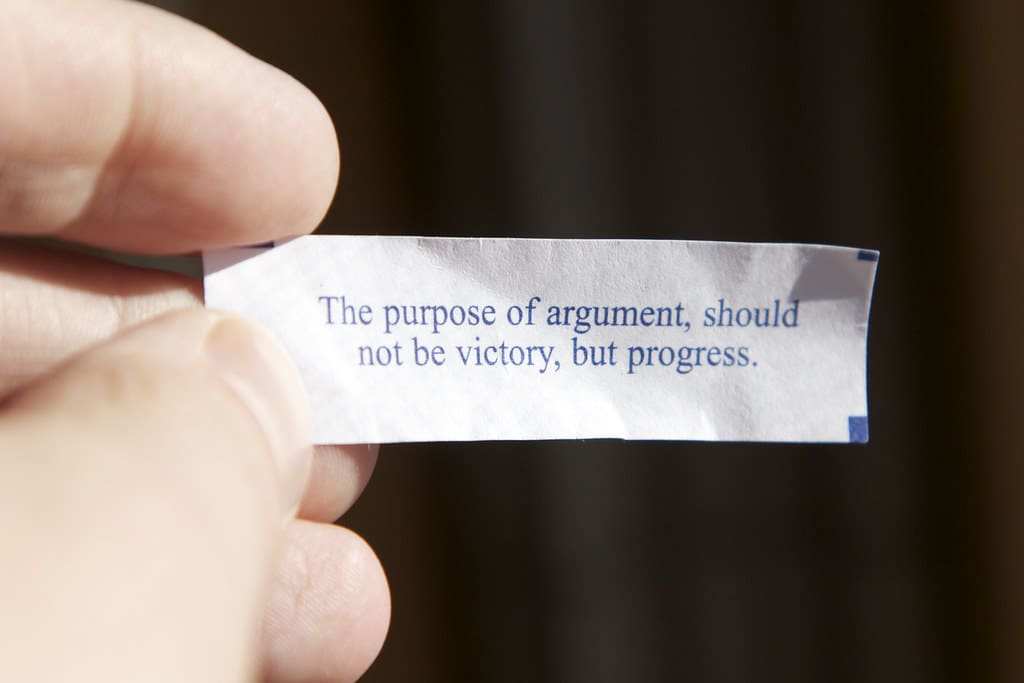Whether you’ve got tension with family members over the holidays, with coworkers about a big project, or just with a friend or partner about a more intimate situation — conflict resolution is an invaluable skill to have in your back pocket. Here are 28 ways you can healthily resolve a conflict.
Really Listen

First off, nothing will ever be resolved if you’re both (or all) just talking to hear yourselves talk. Obviously, you have a point of view you’re passionate about. But so do they. And until you really hear each other, your egos will keep you in conflict.
Try to See It Their Way

Beyond listening, you need to actively employ empathy. Not sympathy — it’s not enough to recognize that they’re upset — empathy. Actually put yourself in their shoes for a moment. If you were in their position, would their reaction make more sense?
Be Patient

Not only is patience a virtue in and of itself, it can also help to set the tone. If you’re keeping your cool, the other people you’re talking to are more likely to follow suit. If you fly off the handle at every little remark, you’re just begging for more trouble.
Choose Your Words Wisely

Words are weapons. We all know this. We’ve been told this since grade school. Some people have a dark talent for doing a lot of damage to others with just a few words. This is not the right time for such manipulation. Speak in a clear, calm, and concise way.
Bring in an Outside Perspective

Sometimes it’s important to bring in an impartial third party. Notice I said impartial. This is not the time to have your sister or best buddy fight your battles for you. If you’re trying to resolve a group conflict at work, this could be a good time to bring in an HR representative or other mediator to ensure fairness. If it’s a one-on-one situation, seek out a mental health or conflict-resolution professional.
Don’t Avoid Compromise

The point here isn’t to win. It’s to maintain healthy relationships, whether they be professional or personal. Compromise isn’t a dirty word. It’s a means to an end, and a path you might learn a lot from.
Put on Your Problem-Solving Cap

Again, the goal here is to clear the way for healthy communication and relationships. Are there steps you can take to address this conflict on your end? We’re not just aiming to stop a fight here. We’re aiming to keep it from happening again.
Stay as Impartial as Possible

Yes, bringing in a third-party can be helpful, but it’s also important for you to remain as impartial as possible if you’re trying to bring about real resolution and change. Egos are messy, and if we’re operating from that place it’s easy to slip into the blame game. That’s not helpful.
Self-Awareness Is Key

If you don’t understand their argument, ask for clarification. If you feel they’re being unfair, check your own bruised ego and tell them so without going on the attack. You’re looking for a win-win, so know when to pause and reflect, and when to speak your mind.
Be Assertive

Don’t hide your head in the sand when a conflict starts brewing. If you know something’s wrong, state it plainly and ask the other party to help resolve it. If you leave things as they are because the conversation sounds “uncomfortable,” you’re doing both sides a disservice. Nothing brews quite like resentment.
But Remain Flexible

Make sure your goal remains resolution, not victory. There needs to be a give and take here. Show understanding and compassion while still making sure your points are heard. If a tactic doesn’t seem to be working, or your words aren’t landing as you hoped they would, regroup and try something else.
Always Speak With Respect

This cannot be overstated. You only earn respect from others by showing respect. If you are belligerent, sarcastic, or mean-spirited your words will fall on deaf ears. But when you make sure that the other party knows you are dedicated to resolution, you can move forward with more success.
Control Your Own Stress

This person or group might be really getting under your skin. But your emotional response is your responsibility. By doing everything in your power to keep your own cool, you demonstrate a path forward. And you safeguard your own mental health.
Stay Calm

We don’t always understand each other. We don’t always have to. The reason you’re in this conflict to begin with is because you have differing opinions on the right way forward. We don’t have to agree on everything. But we can maintain composure.
Speak With Confidence

If you’re trying to put an idea out there, but that idea comes from a shaky voice or insecure body language, it might not register. If you’re confident in the points you’re trying to make, make sure you present them that way.
Watch for Non-Verbal Cues

Body language can sometimes speak louder than words. Pay attention to the other party’s body language, voice intonation, and facial expressions. These might be clues to the root of frustration, and could possibly spark new ideas toward resolution.
Set Clear Boundaries

It’s important to set boundaries and expectations from the outset of a conflict. Set a time limit for your initial meeting. Establish ground rules for tone and behavior. And establish a goal for the interaction, whether that’s an initial conversation or getting to the heart of the matter.
Practice the Art of De-escalation

You can only control your own emotional reaction to a situation, but if the other party seems to be getting out of hand, there are de-escalation methods you can employ. Reminding the person, in a calm manner, of the intention of the interaction is a good start. Re-affirming that you’re listening, and making sure you don’t speak over someone can help to clam things a bit. And reframing things from “You’re wrong, because…” to “I feel like…” can also take the wind out of an argument.
Make Collaboration the Goal

Reframe the argument at hand so that the goal is clearly to collaborate and problem-solve, not to air grievances or attack each other. The focus should be on how to move forward so that everyone feels heard and everyone’s needs are met.
Get to the Root

All the effort in the world isn’t going to solve a situation if you’re not tackling it from the root cause. Everything else is just temporary fixes and ego boosting. What got you here in the first place? What misunderstandings or breakdowns in communication need to be addressed?
Use Creative Thinking

Show your willingness to think outside the box in order to reach a resolution. And invite other ideas to the table. There’s a solution here, you probably just haven’t landed on it yet. Take a breather and reframe your perspective.
Stay Resilient

Sometimes people land low blows. Even if you’ve remained perfectly impartial, patient, and empathetic, it doesn’t mean you won’t sometimes get caught off guard by someone’s anger. Stay resilient so you can bounce back from these interactions without sacrificing your own mental well-being.
Be Tactful

On the flip side, some of us aren’t naturally gifted with tactfulness. It’s important to really consider your words. You might be using turns of phrase that you wouldn’t bat an eyelash at if you were on the receiving end. That doesn’t mean the other person has such tough skin. Stay kind, positive, and dedicated to a mutually-beneficial outcome.
Forgive

They say “Holding a grudge is like drinking poison and hoping it kills the other person.” By holding on to anger for anger’s sake, you’re only harming yourself. Let go of old resentments, whether acknowledged or not, in order to move forward with your own sanity in tact. And allow others the space to do so as well.
Read More: 10 Signs Someone May Be a Narcissist
Cultural Awareness Matters

Cultural sensitivity, whether in professional or personal settings, can prevent misunderstandings and improve communications. And in the case of an established conflict, it can often shed light on an easier way to move forward. Don’t assume you know everyone’s background, or their intentions.
Read More: 11 Things Narcissists Say to their Victims (and What They Really Mean)
Aim for a Consensus

We’ve said it before, but let’s say it again. The goal here is not victory. It is for everyone to feel respected, seen, heard, and appreciated despite differing opinions and viewpoints. If your goal is to win, and only to win, you should probably go ahead and see yourself out of the situation.
Read More: 10 Simple Tips to Become a Better Listener
Check Back In

When you’ve finally achieved what feels like peace or resolution, don’t assume it’s a one-and-done deal. Check back in to make sure communication runs smoothly, and to ensure old resentments don’t pop their ugly heads back up to complicate things again.
Read More: The Most Controversial TV Episodes Ever Aired
Stay Open-Minded

We’ve come to the moral of the story, folks. The big takeaway, if you will. Your best bet in resolving ongoing conflict is to keep an open mind. Not only toward other perspectives, but toward new ideas, strategies, and solutions. Try to learn something from it. Then if the issue comes back up again, you’ll be well-equipped to handle it.
Read More: 10 Reasons Why Everyone Needs A Therapist








